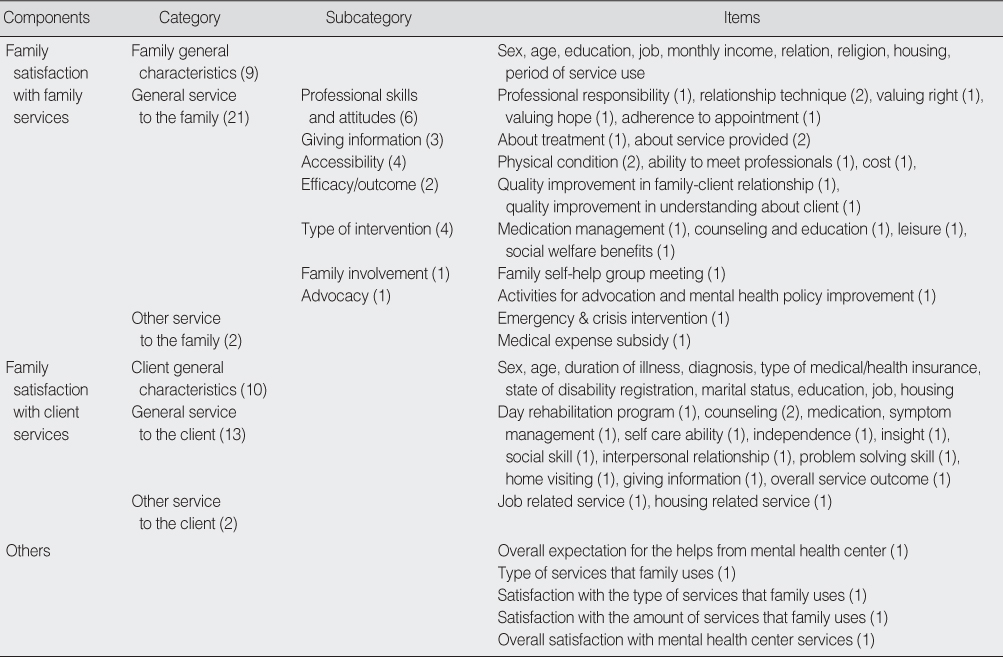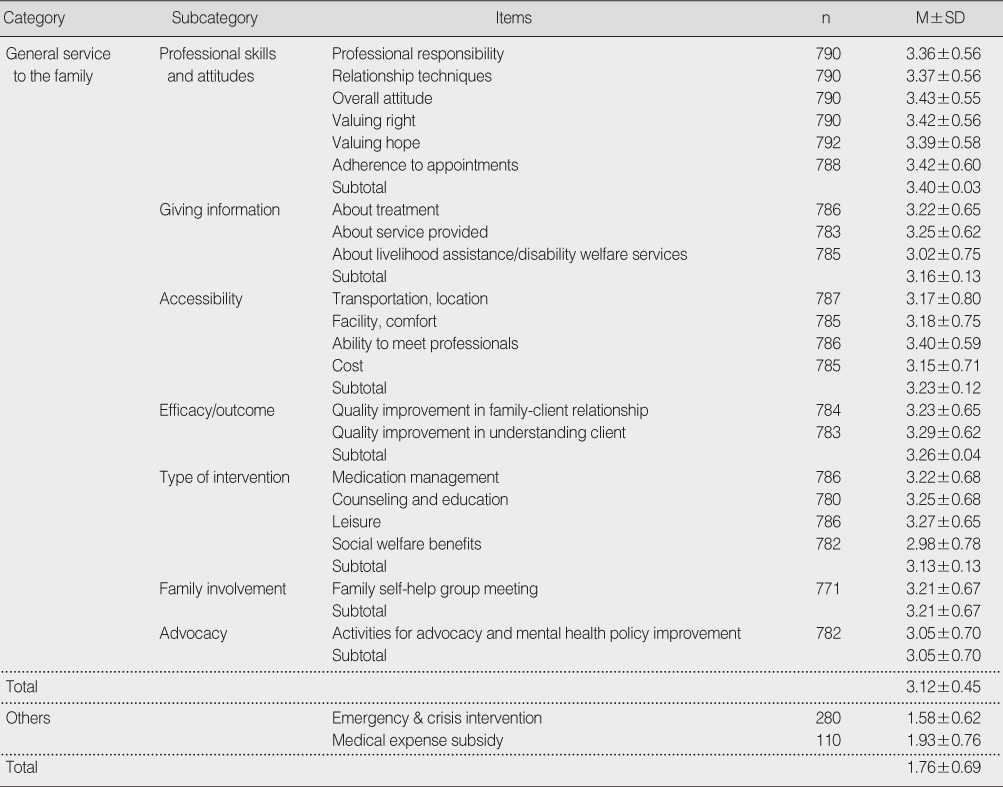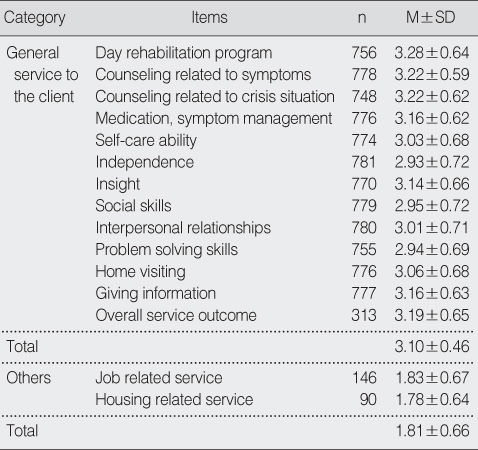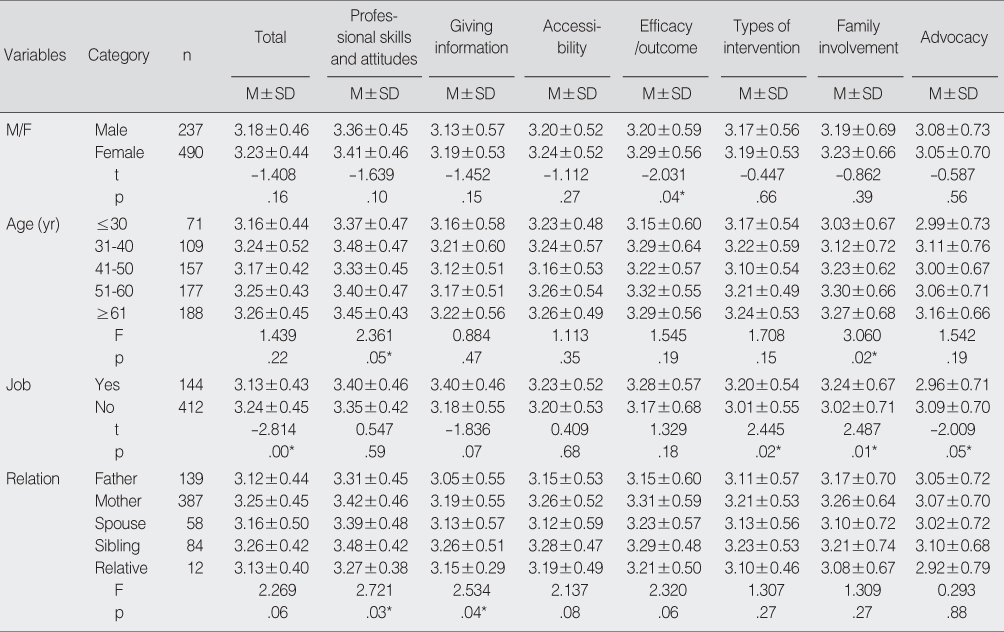Articles
- Page Path
- HOME > J Korean Acad Nurs > Volume 39(1); 2009 > Article
-
Original Article
- A Study on Family Satisfaction with Community Mental Health Center Services in Gyeonggi Province by Families of People with Mental Illness
- Hee Jung Kim
-
Journal of Korean Academy of Nursing 2009;39(1):124-135.
DOI: https://doi.org/10.4040/jkan.2009.39.1.124
Published online: February 28, 2009
Associate Professor, Department of Nursing, Kyungwon University, Seongnam, Korea.
- Address reprint requests to: Kim, Hee Jung. Department of Nursing, Kyungwon University, San 65 Bokjeong-dong, Sujeong-gu, Seongnam 461-702, Korea. Tel: 82-31-750-5978, Fax: 82-31-721-8859, illine1214@kyungwon.ac.kr
Copyright © 2009 Korean Society of Nursing Science
- 895 Views
- 4 Download
Abstract
-
Purpose
- The purpose of this study was to evaluate the service satisfaction for families who have someone with mental illness, and are using community mental health centers in Gyeonggi Province.
-
Methods
- The participants in this study were 796 family members. Data were collected using Family satisfaction survey questionnaire developed by the author (23 items on family service and 15 items on client service).
-
Results
- The total satisfaction level for the service with family and client resulted in above average scores. Of the 23 service items, data showed the highest level of satisfaction was with professional skills and attitude, and day rehabilitation programs, and the lowest for professional activities for advocacy and social welfare benefits, emergency & crisis intervention, medical expense subsidies. Of the 15 service items, job and housing related service had the lowest level of satisfaction.
-
Conclusion
- It is recommended that psychiatric emergency & crisis intervention programs and system development be accelerated. Also, there is a need to develop medical expense subsidy programs for older family caregivers, job and housing focused rehabilitation programs and community facilities for the client, as well as more active and powerful professional advocate activities for persons who have mental disabilities and their families.
- 1. Chi KH. An assessment of the needs for mental health service of mentally ill patients and their family in Cheongwongun. 2001;Cheongju, Chungbuk University. Unpublished master's thesis.
- 2. Choi HM. A study on the care burden and service needs of the family of mentally ill person. Social Science Research in Pyeongtaek University. 2002;6:45–59.
- 3. Choi SI. The study about service need of the family and care giver of the mental illness in home. 2002;Yongin, Gangnam University. Unpublished master's thesis.
- 4. Donabedian A. Evaluating the quality of medical care. Millbank Memorial Fund Quarterly. 1966;44:166–203.Article
- 5. Eriksen LR. Patient satisfaction with nursing care: Concept clarification. Journal of Nursing Measurement. 1995;3:59–76.ArticlePubMed
- 6. Jeong JY. The research about professional helping for the family having someone who have mental disorder, using community mental health center. 2000;Seoul, Kyung Hee University. Unpublished master's thesis.
- 7. Kim HJ. The stress process of the family caregivers of the mentally ill. 2000;Seoul, Ewha Womans University. Unpublished doctoral dissertation.
- 8. Kim JH, Lee IS. The differences in quality perception, expectations, evaluation, and satisfaction for nursing service between patients and nurses: Small-medium sized general hospitals. Journal of Korean Academy of Nursing. 2004;34:1243–1254.PubMed
- 9. Mental Health Practice Guideline. Korea Ministry for Health, Welfare and Family Affairs. 2008;Retrieved November 11, 2008. from http://www.mw.go.kr.
- 10. Lee CY. A study on the effectiveness of social skill training program at the residential care facilities for mental patients. 2000;Gwangju, Honam University. Unpublished master's thesis.
- 11. Lee MA. A study of the nursing service quality and gap perceived by consumers. Journal of Korean Academy of Nursing. 2004;34:225–234.ArticlePubMedPDF
- 12. Lefley HP. Aging parents as caregivers of mentally ill adult children: An emerging social problem. Hospital and Community Psychiatry. 1987;38:1063–1069.ArticlePubMed
- 13. Linder-Pelz S. Social psychological determinants of patient satisfaction: A test of five hypothesis. Social Science Medicine. 1982;16:583–589.PubMed
- 14. Mason K, Olmos-Gallo A, Bacon D, McQuiken M, Henley A, Fisher S. Exploring the consumer's and provider's perspective on service quality in community mental health care. Community Mental Health Journal. 2004;40:33–46.ArticlePubMed
- 15. Oh HJ. A study on the burden of family caregiving with mentally ill and professional needs to it. Journal of Korean Academy of Nursing. 2000;30:202–212.
- 16. Oliver RL. A cognitive model of antecedents and consequences of satisfaction decision. Journal of Marketing Research. 1980;17:460–469.ArticlePDF
- 17. Osmar MA, Schiffman RF. Pregnant women's perceptions of prenatal care. Maternal-child Nursing Journal. 1995;23:132–142.PubMed
- 18. Park EJ. Review of patient satisfaction with case management. Journal of Korean Academy of Nursing Administration. 2007;13:311–320.
- 19. Pekarik G. Relationship of clients' reasons for dropping out of treatment to outcome and satisfaction. Journal of Clinical Psychology. 1992;48:91–98.ArticlePubMed
- 20. Radwin L. Oncology patient's perceptions of quality nursing care. Research in Nursing and Health. 2000;23:179–190.ArticlePubMed
- 21. Risser NL. Development of an instrument to measure patient satisfaction with nurses and nursing care in primary care setting. Nursing Research. 1975;24:45–52.PubMed
- 22. Ruggeri M. Patients' and relatives' satisfaction with psychiatric services: The state of the art of its measurement. Social Psychiatry and Psychiatric Epidemiology. 1994;29:212–227.ArticlePubMedPDF
- 23. Son BK. The relationship between family burden and burnout of mentally ill patient. 2005;Daegu, Daegu University. Unpublished master's thesis.
- 24. Son MS. A study on determinants of schizophrenic patients' family members. 2002;Busan, Donguie University. Unpublished master's thesis.
- 25. Thompson AG, Suñol R. Expectations as determinants of patient satisfaction: Concepts, theory and evidence. International Journal of Quality in Health Care. 1995;7:127–141.Article
- 26. Yang JN, Kim JS, Kim JI. Effectiveness of a day care rehabilitation program for chronic mentally ill patients. Dongshin University Journal. 2004;14:229–244.
- 27. Yang OK. Families of the mentally ill - Care burden, coping and service needs. Journal of the Korean Neuropsychiatric Association. 1995;34:809–829.
- 28. Yun J. A study on the points about the rehabilitation of the chronic mental patients and on the improvement devices of their families' services. 2003;Seoul, Yonsei University. Unpublished master's thesis.
REFERENCES
Figure & Data
REFERENCES
Citations

Survey Components and Items ( ): Number of items
Family Satisfaction with the Services to the Family by the Mental Health Center
Family Satisfaction with Mental Health Center Services to the Client
Family Satisfaction with Mental Health Center General Services to the Family according to Family Characteristics
*p≤.05.
Family Satisfaction with General Services to the Family, Emergency and Crisis intervention, Medical Expense Subsidy according to Length of Time that the Mental Health Center has been in Business
*p<.05; LT=length of time that the mental health center has been in business.
*p≤.05.
*p<.05; LT=length of time that the mental health center has been in business.
 KSNS
KSNS
 E-SUBMISSION
E-SUBMISSION





 Cite
Cite

